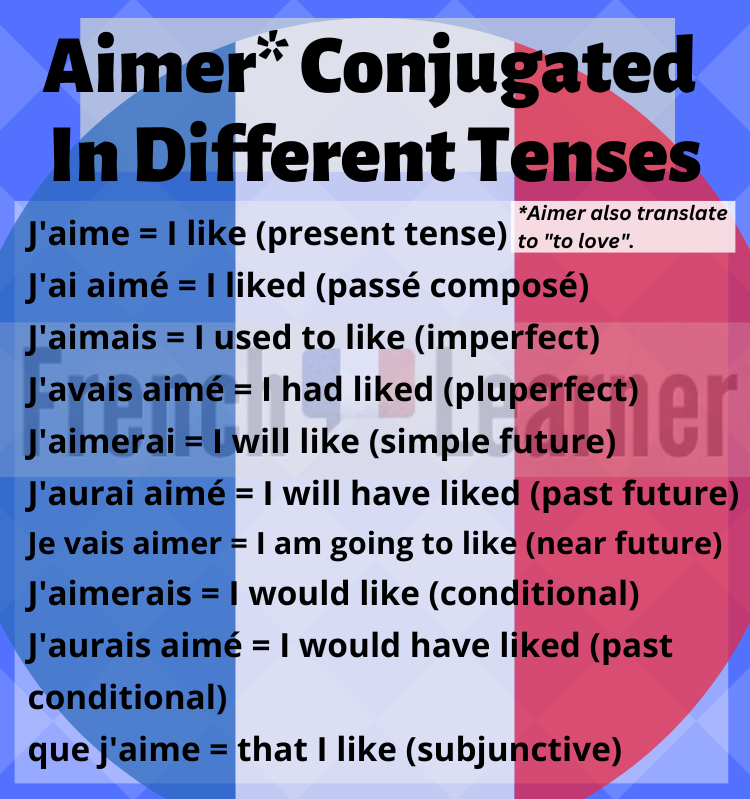The conjugation of aimer (Meaning: to like, to love in French; Pronunciation: eme) is j’aime (I like), tu aimes (you like), il/elle aime (he/she likes), nous aimons (we like), vous aimez (you like) and ils/elles aiment (they like). This post will cover conjugation tables of aimer in nine major tense as well as common usages.

Aimer is regular -er verb. This means that its endings are the same as all other regular verbs which end in -er in the infinitive form. In the passé composé, aimer uses avoir (to have) as an auxiliary verb.
Note that when reading through the charts on this page (see below), we often translate aimer to “to like”. We could just have easily written “to love” in almost all cases.
Further down the page we’ve provided conjugation tables of aimer in the following eight major tense with example sentences.
- present tense (le présent)
- past tense (passé composé)
- imperfect (l’imparfait)
- future (le futur simple)
- conditional (le conditionnel)
- past conditional (le passé du conditionnel)
- subjunctive (le subjonctif)

Common uses of aimer
Before looking at the conjugation tables, let’s have a quick look at several common ways to use aimer.
1. Aimer + noun
The most common usage of aimer is to express the liking of things. For example:
- J’aime les montagnes. I like mountains.
- Je n’aime pas l’océan. I don’t like the ocean.
2. Aimer + verb in infinitive form
The second most common usage of aimer is to express the liking of actions. For example:
- J’aime chanter cette chanson. I like singing this song.
- Je n’aime pas manger le chou-fleur. I don’t like eating cauliflower.
3. I love you = je t’aime
The verb aimer is used in the expression, je t’aime, which means I love you.
4. Aimer bien = to like
The French combine aimer with the adverb bien (well) to mean “to like”. For example:
- J’aime bien faire du ski en semaine. I like skiing on week days.
Interestingly, there is a subtle difference between je t’aime (I love you) and je t’aime bien. The latter, je t’aime bien, means I like you but there’s little to no emotion attached to the the expression. An English equivalent might be “you’re alright”.
5. Aimer mieux = to prefer
When combined with the word mieux (better), aimer mieux means to prefer. For example:
- J’aime mieux cette station de ski. I prefer this ski area.
6. s’aimer = to like or love each other
In the reflexive form, s’aimer means to like or love each other. For example:
- Marc et sylvie s’aime depuis le lycée. Marc and Sylvie have loved each other since high school.
Aimer vs. adorer
Aimer means “to like” and “to love” while adorer can also mean “to adore” and “to love”. There are subtle differences between these two verbs. Aimer can be used for both people and things. For example:
- Je t’aime. I love you.
- J’aime ce chocolat. I like/love this chocolate.
The verb adorer, however, is mostly limited to things, objects and actives. Using adorer for people would sound awkward to the French ear.
- J’adore ce chocolat. I adore/love this chocolat.
- J’adore le ski. I l adore/love skiing.
That said, there is no fine line between aimer and adorer. Hence, the song title Oui, je l’adore (Yes, I love him) by Pauline Ester.
Aimer conjugation table

Aimer conjugation charts
The following section contains conjugation tables of aimer in seven major French verb tenses with example sentences.
Present tense (present indicative)
This chart shows the aimer conjugated in the present tense (le présent de l’indicatif). In hte present tense, j’aime translates to “I like you” and “I love you”.
| J'aime | I like, love | J'aime la pizza. | I like pizza. |
| Tu aimes | You like, love (familiar, singular) | Tu aimes la glace. | You like ice cream. |
| Il/elle aime | He/she likes, loves | Il aime faire du ski. | He likes skiing. |
| Nous aimons | We like, love | Elle aime habiter en France. | She likes living in France. |
| Vous aimez | You like (formal, plural) | Vous aimez cette chanson. | You like this song. |
| Ils/elles aiment | They like | Ils aime leur maison. | They like their house. |
Passé composé (compound past)
The next tense we’ll look at is the passé composé, a commonly used French past tense used for completed actions. In French, j’ai aimé can translate to “I liked” and “I have liked”.
| J'ai aimé | I liked | J'ai aimé le voyage. | I liked the trip. |
| Tu as aimé | You liked (familiar, singular) | Tu as aimé le repas. | You liked the meal. |
| Il/elle a aimé | He/she liked | Elle a aimé les fleurs. | She liked the flowers. |
| Nous avons aimé | We liked | Nous avons aimé le musée. | We liked the museum. |
| Vous avez aimé | You liked (formal, plural) | Vous avez aimé la leçon. | You liked the lesson. |
| Ils, elles ont aimé | They liked | Ils ont ont aimé leur hôtel. | They liked their hotel. |
Passé simple
The passé simple is a literary past tense. It equates grammatical to the passé composé in that it’s used for describing past events which occurred at specific times. It’s important to recognize the passé simple endings in literature reading.
Hence, j’aimai equates to j’ai aimé grammatically and means “I liked”.
| J'aimai | I liked | J'aimai le film. | I liked the movie. |
| Tu aimas | You liked (informal, singular) | Tu aimas le roman. | You liked the novel. |
| Il/elle aima | He/she liked | Elle aima le repas. | She liked the meal. |
| nous aimâmes | We liked | Nous aimâmes le poème. | We liked the poem. |
| Vous aimâtes | You liked (formal, plural) | Vous aimâtes le petit-déjeuner. | You liked the breakfast. |
| Ils/elles aimèrent | They liked | Ils aimèrent le voyage en Espagne. | They liked the trip to Spain. |
Imperfect (l’imparfait)
The French imperfect indicative (l’imparfait) tense is used to describe past actions which took place at undefined time. For example, j’aimais translates to “I used to like” and and “I was liking”.
| J'aimais | I used to like | Avant, j'aimais manger la viande. | Before, I used to like eating meat. |
| Tu aimais | You used to like (familiar, singular) | Quand j'étais un enfant, j'aimais faire du ski. | When I was a child, I used to like skiing. |
| Il/elle aimait | He/she used to like | Dans le passé, elle aimait faire du surf. | In the past, she used to like surfing. |
| Nous aimions | We used to like | Avant, nous aimions regarder la télé tous les soir. | Before, we used to like watching TV every night. |
| Vous aimiez | You used to like (formal, plural) | Vous aimiez faire du ski quand vous aviez quinze ans. | You used to like skiing when you were 15 years-old. |
| Ils/elles aimaient | They used to like | Ils aimaient faire de la randonée quand ils habitaient dans les montagnes. | They used to like hiking when they lived in the mountains. |
Near future (le futur proche)
The French use the near future tense (le futur proche) to express future actions which will occur with a high degree of certainty. The construction is aller (to go) conjugated in the present tense followed by the infinitive. Hence, je vais aimer translates to “I am going to like”.
| Je vais aimer | I'm going to like | Je vais aimer ce roman. | I'm going to like this novel. |
| Tu vas aimer | You're going to like (familiar, singular) | Tu vas aimer la soupe. | You're going to like the soup. |
| Il/elle va aimer | He's/she's going to like | Elle va aimer la nouvelle voiture. | She's going to like the new car. |
| Nous allons aimer | We're going to like | Nous allons aimer cette belle région. | We're going to like this beautiful region. |
| Vous allez aimer | You're going to like (formal, plural) | Vous allez aimer cette chanson. | You're going to like this song. |
| Ils/elles vont aimer | They're going to like | Ils vont aimer leur voyage en Espagne. | They're going to like their trip to Spain. |
Simple future (le futur simple)
The next tense on our list the French future tense or the futur simple. In French, j’aimerai simply translates to “I will like”.
| J'aimerai | I will like | Il pense que j'aimerai la chanson. | He thinks I'll like the song. |
| Tu aimeras | You will like (familiar, singular) | J'espère que tu aimeras le repas. | I hope you'll like the meal. |
| Il/elle aimera | He/she will like | Je ne sais pas s'il aimera la soupe. | I don't know if he'll like the soup. |
| Nous aimerons | We will like | Il dit que nous aimerons le voyage. | He's saying we'll like the trip. |
| Vous aimerez | You will like (formal, plural) | Je suis sûr que vous aimerez le film. | I'm sure you'll like the movie. |
| Ils/elles aimeront | They will like | J'espère qu'ils aimeront la voiture. | I hope they'll like the car. |
Conditional (le conditionnel)
In French, the conditional (le conditionnel) is used to express hypothetical or actions that “would” occur. J’aimerais translates literally to “I would like”.
It can precede both a noun or verb. In French, j’aimerais and je voudrais are synonyms. The page on our site covers vouloir (to want). For example:
- J’aimerais (= voudrais) une glace. I’d like an ice cream.
- J’aimerais (= voudrais) manger une glace. I’d like to eat an ice cream.
| J'aimerais | I would like | J'aimerais partir demain. | I would like to leave tomorrow. |
| Tu aimerais | You would like (familiar, singular) | Tu aimerais le chocolat. | You would like the chocolate. |
| Il/elle aimerait | He/she would like | Il aimerait acheter la voiture. | He would like to buy the car. |
| Nous aimerions | We would like | Nous aimerions vendre la maison. | We'd like to sell the house. |
| Vous aimeriez | You would like (formal, plural) | Vous aimeriez ces billets. | You would like these tickets. |
| Ils/elles aimeraient | They would like | Ils aimeraient danser ensemble. | They would like to dance together. |
Past conditional (le passé du conditionnel)
The past conditional tense (le passé du conditionnel) is a bit more advance but very useful in spoken French. The French use it primarily to express regrets.
J’aurais aimé means “I would have liked” and combines avoir (to have) in the conditional form with the past participle aimé.
| J'aurais aimé | I would have liked | J'aurais aimé partir un peu plus tôt. | I would have liked to leave a bit earlier. |
| Tu aurais aimé | You would have liked (informal, singular) | Qu'est-ce que tu aurais aimé faire? | What would you have liked to do? |
| Il/elle aurait aimé | He/she would have liked | Il aurait aimé la pizza. | He would have liked the pizza. |
| Nous aurions aimé | We would have liked | Nous aurions aimé ce restaurant. | We would have liked this restaurant. |
| Vous auriez aimé | You would have liked (formal, plural | Vous auriez aimé visiter l'Italie. | You would have liked visiting Italy. |
| Ils auraient aimé | They would have liked | Ils auraient aimé connaître cette région. | They would have liked getting to know this region. |
Subjunctive (le subjonctif)
The French use the subjunctive (le sunbonctif) mood to express wishes, emotions and doubts. In French, que j’aime translates to “that I like”.
| que j'aime | that I like | Il doute que j'aime la soupe. | He doubts I like the soup. |
| que tu aimes | that you like (singular, informal) | Il est heureux que tu aimes la pizza. | He's happy you like the pizza. |
| qu'il/elle aime | that he/she likes | Je suis content qu'elle aime les skis. | I'm happy she likes the skis. |
| que nous aimions | that we like | Il est content que nous aimions le repas. | He's happy we like the meal. |
| que vous aimiez | that you like (plural, formal) | Je suis ravi que vous aimiez le restaurant. | I'm delighted you like the restaurant. |
| qu'ils/elles aiment | that they like | Il faut qu'ils aiment la chambre. | They need to like the room. |



